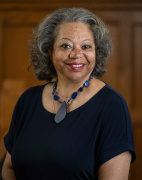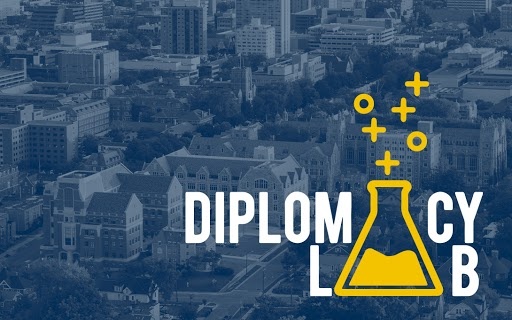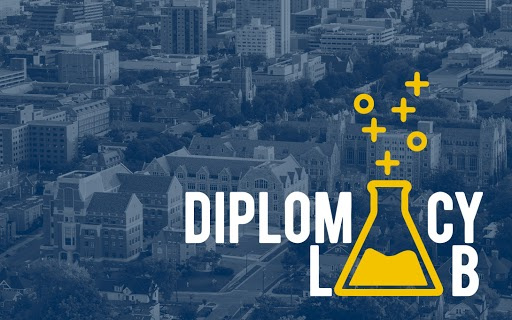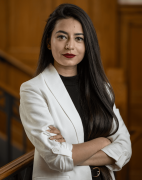
-
Applying for Diplomacy Lab
Each semester, the State Department sends partner universities a list of policy-relevant research questions posed by officials serving in the field. The Weiser Diplomacy Center (WDC) will then issue a call for proposals, usually in April for fall semester projects and in September for winter term projects, and share a project menu. WDC typically asks students to submit bids via the Student Team Application in Google Forms within two weeks from the call for applications.
We ask student teams to provide resumes or CVs for team members and a concise project description of up to 200 words. This should include a short description of how your team proposes to approach the project in question, as well as basic information on why your team members and faculty supervisor are appropriate for the project.
Bidding process
WDC reviews the bid applications and may select up to six bids to nominate to the State Department. The State Department runs a matching process in which the officials who posed the research questions review the bids submitted for their projects. If your team is nominated and then selected through the matching process, you will be introduced to the relevant State Department officials and spend the semester working part-time on the project, consulting with your State Department contacts periodically before delivering your findings. If your team is not selected in the first round of bidding, a second round of bidding is sometimes possible.
Student Teams’ Roles & Responsibilities
University of Michigan graduate or undergraduate students registered in the semester when the research would occur may form small teams of four to six members, identify a willing faculty supervisor, and submit bids for a project.
Students are welcome to assemble a team that includes colleagues from your school or department or to form an interdisciplinary team with members from various campus units. Your team should include either graduate or undergraduate students, but not a mix of both. You should try to build a team with relevant background knowledge and research skills, but there is no expectation that all of you will have in-depth knowledge of the topic at hand. Demonstrated interest, general academic and professions skills, and strong team cohesion are also valued qualities.
International students: the State Department has informed WDC that it considers participation in Diplomacy Lab to be an academic or co-curricular program and not as an internship, externship or other work arrangement for purposes of student visa requirements.
Faculty Roles & Responsibilities
Faculty supervisors play an important part in Diplomacy Lab. They provide guidance and direction to student teams throughout the life of the project. Faculty supervisors also serve as the principal point of contact between the project team and the State Department unless or until the State Department officials involved agree to the designation of a student to serve as the designated point of contact. At or before the start of the term, faculty supervisors should help arrange an introductory meeting between the student team and the State Department officials involved. Faculty supervisors also should plan to attend at least one mid-term check-in meeting and the students’ final presentation, and they are responsible for soliciting feedback from the State Department at the conclusion of the project.
Faculty supervisors may opt to conduct Diplomacy Lab as an extracurricular activity or as a credit-earning independent study, subject to the applicable rules in their home schools or departments. University of Michigan faculty interested to lead a project may contact WDC for further information.
Selecting a Faculty Supervisor
All Diplomacy Lab projects require an active and engaged faculty supervisor. As noted above, your faculty supervisor will provide guidance throughout the semester and will serve as the main point of contact for the State Department officials working with your team. It is naturally good to select a supervisor with relevant topical expertise, but it is equally important that your supervisor be available to commit the necessary time and dedication to your project.
Most Diplomacy Lab projects involve conducting research and preparing policy memos that include relevant qualitative and/or quantitative data and any necessary appendices. Some projects involve longer research papers. The document that outlines the eligible research questions each semester will contain some project details.
Expectations, timelines, and project deliverable
1) If your bid is selected, the State Department officials who requested the research will reach out to your faculty supervisor to set up an initial meeting with your group, introduce you to available resources and contacts. At that meeting you will get acquainted, discuss further details, ask for any information you may need for your project and establish a basic timeline.
2) Develop clear expectations in terms of the respective roles of students within your Diplomacy Lab project. Who will be researching and submitting contributions? Who will coordinate submission of a final report? How will the various contributions be streamlined?
3) Have a set timeline that builds in adequate time for review and editing prior to the submission of the final product to the Department of State.
4) Establish regular meetings with your team, and your supervising faculty. For example, teams can meet weekly alone and bi-weekly with the supervising faculty depending on how frequently you will require status updates and draft reviews.
5) Determine early in the semester what the final product that is submitted will look like, e.g., how many pages, format, etc.
6) Teams and supervising faculty should engage in video and teleconferences with State Department officials and receive feedback. This will help clarify any questions you may have on your project early and ensure that you are on the right track.
7) Set up the dates to meet with the State Department in advance to avoid scheduling conflicts. At a minimum, meet online at least:
- Once before the project begins,
- Once at the start of term and once around the middle of the term.
- Some teams may also have final conferences with State Department officials at the end of the project to discuss their findings, via videoconference or in person if funding and travel restrictions permit.
8) Anticipate potential modifications to the scope of the project, timelines, and be willing to be flexible in this regard.
Additional guidelines
DIPLOMACY LAB PROJECT REPORTING
Final deliverables are shared with the State Department at a final presentation. A copy of final project is due to Weiser Diplomacy Center within a week of the final presentation.
PUBLICITY & OUTREACH
Students, faculty and staff will collaborate to publicize Diplomacy Lab via articles, quotes and impact pages on Weiser Diplomacy and Ford School websites and social media.



